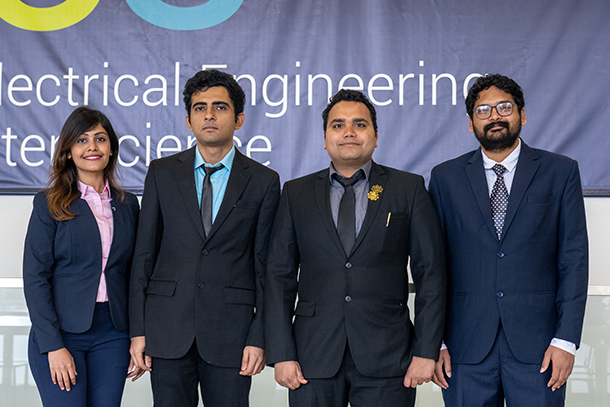
From left to right: Neha Rathod, Garv Jasuja and Akshay Kumar Gupta, master’s students in computer science and engineering, and Vijay Bhaskar Chiluveru, a master’s student in energy and mineral engineering in the College of Earth and Mineral Sciences, found success at national computer science competitions, including the Microsoft Imagine cup. Credit: Jeff Xu/Penn State. All Rights Reserved.
Engineering graduate students named finalists at Microsoft Imagine Cup
May 12, 2023
By Mariah R. Lucas
UNIVERSITY PARK, Pa. — A group of Penn State computer science graduate students were declared world finalists in March at the Microsoft Imagine Cup, where students across the globe compete to create software applications to solve technical challenges.
Since 2003, the Imagine Cup has brought together thousands of students from more than 150 countries. The top prize is $100,000 and includes mentoring sessions with top Microsoft leaders.
For their entry, the Penn State team developed a wireless device to help detect anomalies in users’ breathing or heart rates, which they named Alert Heart.
“The device can detect and prevent cardiac arrest among patients through wireless sensing technology from a short distance away,” said team member Akshay Kumar Gupta, a master’s student in computer science. “It can sit on top of a bed and operates like a smoke alarm, alerting caregivers whenever there is a breathing or heart rate anomaly.”
Penn State was one of 48 teams to be invited to the final round, where they presented their prototype on a video call and advanced to the top 24 before being eliminated. They received $1,000 in cloud credits from Microsoft to use to improve Alert Heart’s software.
In addition to Gupta, Vijay Bhaskar Chiluveru, a master’s student in energy and mineral engineering in the College of Earth and Mineral Sciences, and Neha Rathod and Garv Jasuja, both master’s students in computer science, rounded out the team. Sarabeth Brandt, a doctoral student in electrical engineering, contributed to Alert Heart’s brainstorming phase.
The Imagine Cup, however, is far from the group’s first success.
During the 2022-23 academic year alone, the team competed and won prizes in hackathons hosted by Princeton University, Brown University, the University of Pennsylvania, Harvard University, Johns Hopkins University and Yale University.
“I like to work on software for the health domain as I believe its impact can be felt the most,” Gupta said. “Because of that, my favorite competition was the patient safety challenge at Johns Hopkins University, where we were tasked with creating a device or software that can help increase patient safety. Given that many patients now are moving away from hospital care to home-based care, we created a wearable belt that can detect if a patient has fallen and alert their caregivers.”
Each team member has different research interests and areas of expertise that they bring to the challenges. Chiluveru provides data analysis for the team, while Neha focuses on artificial intelligence. Gupta and Jasuja, meanwhile, focus on cloud, mobile programming and hardware development.
“HackHarvard2022 is uniquely close to my heart,” Chiluveru said. “It marked a lot of firsts for me. It was my first hackathon in the United States; my first win in my treasured category of sustainability; my first proof-of-concept of data-enabled, drone-based sustainability transparency; and my first crack at MATLAB proficiency.”
In designing solutions for the many challenges, Chiluveru said his proficiency in coding languages like MATLAB, R and Python improved significantly.
“As an international student at Penn State, I am always on the lookout for a holistic experience that extends beyond the academics and extracurriculars on campus,” Chiluveru said. “Participating in these Ivy League hackathons and global competitions held by multinational companies has exposed me to team building, collaboration, networking and insight on current design trends.”
The team also succeeded in competitions close to home. They won $10,000 for first place at the Happy Valley Venture Capital & Innoblue Pitch Competition organized during Penn State’s Startup Week for their project, Alert Heart.
They also were shortlisted for the Nittany AI Challenge, sponsored by Penn State Outreach, where they were among the top 10 teams chosen for the prototype phase of the competition, for which they received $2,000 to further improve Alert Heart. They will compete for a top prize of $25,000 in September at the AI for Good Expo, held at the HUB-Robeson center.
“Participating in various competitions has enabled me to apply the computer science curriculum in practical ways,” Jasuja said. “Competitions are a bridge for me between the theoretical knowledge gained in the classroom and the practical knowledge needed in industry.”
In addition to the Penn State students, computer science graduate students Syed Muntaser, from the Florida Institute of Technology, and Ahmad Hadidi, from the University of Maryland, also contributed to several of the competitions.



